Regulating Effects of Dietary Fiber and Powder of Agaricus bisporus Based on in Vitro Fermentation on Human Gut Microbiota
-
摘要: 目的:探究双胞菇膳食纤维以及双胞菇粉对肠道菌群的调节功能。方法:通过水提醇沉的方法提取双胞菇膳食纤维和双胞菇粉末进行肠道微生物体外发酵,测定代谢产物中pH、产气量、短链脂肪酸的含量,采用IlluminaPE250测序平台对粪便微生物V4区进行富集测序,探究双胞菇膳食纤维和双胞菇粉对于肠道菌群中短链脂肪酸产生菌相对丰度的影响。结果:以低聚果糖为阳性对照组,不加膳食纤维为空白对照组,体外发酵过程中,随着时间的增加,双胞菇膳食纤维组pH从6.93下降到4.48,双胞菇粉末pH从6.93下降至4.86;随着时间的增加,与空白组相比,双胞菇膳食纤维组和双胞菇粉末组的产气量分别增加了3.4和1.9 mL;在体外发酵24 h后发现,与阳性对照组相比,双胞菇膳食纤维组和双胞菇粉末组的肠道菌群丰富度和多样性更高;双胞菇膳食纤维组和双胞菇粉末组均能被肠道微生物利用产生短链脂肪酸,与空白组相比,双胞菇膳食纤维组更有利于被肠道微生物利用产生乙酸(34.3 mmol/L)和丙酸(7.6 mmol/L),促进有益菌属双歧杆菌属的生长,双胞菇粉末组更有利于产生乙酸(39.4 mmol/L),促进肠杆菌属的生长;与阳性对照组相比,双胞菇膳食纤维组和双胞菇粉末组的丙酸产量更高。结论:双胞菇膳食纤维和双胞菇粉末均能被肠道菌群有效利用,产生短链脂肪酸,提高有益菌的相对丰度,与空白组相比,添加双胞菇膳食纤维的实验组效果最佳,对人体肠道菌群存在有效的益生调节功能。Abstract: Objective: To explore the regulating function of the dietary fiber of Agaricus bisporus and the powder of Agaricus bisporus on the human gut microbiota. Methods: Dietary fiber of Agaricus bisporus were extracted by water extraction and alcohol precipitation for human gut microbial fermentation in vitro. The pH, gas production and short-chain fatty acid contents of metabolites were determined. The V4 region of fecal microorganisms was enriched and sequenced by IlluminaPE250 sequencing platform. Results: Taking fructo-oligosaccharide as the positive control group and without dietary fiber as the blank control group, during the in vitro fermentation process, with the increase of time, the pH value of the Agaricus bisporus dietary fiber group decreased from 6.93 to 4.48, and the pH value of the powder of Agaricus bisporus decreased from 6.93 to 4.86. With the increasing of time, compared with the blank group, the gas production of the Agaricus bisporus dietary fiber group and the powder of Agaricus bisporus group increased by 3.4 and 1.9 mL. After 24 hours of in vitro fermentation, it was found that compared with the positive control group, the richness and diversity of the human gut microbiota in the Agaricus bisporus dietary fiber group and the powder of Agaricus bisporus group were relatively higher. Compared with the blank group, dietary fiber of Agaricus bisporus group was more conducive to the production of acetic acid (34.3 mmol/L) and propionic acid (7.6 mmol/L) by human gut microbiota and promoted the growth of beneficial bacteria of Bifidobacterium. The powder of Agaricus bisporus group was more conducive to producing acetic acid (39.4 mmol/L) and promoting the growth of Enterobacter. Compared with the positive control group, the production of propionic acid in the Agaricus bisporus dietary fiber group and the powder of Agaricus bisporus group was relatively higher. Conclusion: Both the dietary fiber of the Agaricus bisporus and the powder of Agaricus bisporus could be effectively utilized by the human gut microbiota to produce short-chain fatty acids and increase the relative abundance of beneficial bacteria. Compared with blank group, dietary fiber of Agaricus bisporus added in experimental group had the best results, which had an effective prebiotic regulation function on human gut microbiota.
-
人类的肠道是重要的微生态系统,已被发现具有1500多种不同种类的微生物,占人体微生物总量的78%[1],这些微生物直接参与人体的营养吸收、免疫调节等生理活动,影响着人类的健康,目前大量研究发现,肠道的菌群紊乱会导致诸如糖尿病[2]、肠炎[3]、肥胖症[4]等各类疾病,肠道微生物的生理活动成为维护人体健康的天然屏障[5]。因为肠道微生物可以发酵未消化的膳食纤维、蛋白质等物质[6],同时生成的代谢产物对人体健康具有重要的影响,所以近年来从肠道微生物的角度关注多糖、膳食纤维对人体的影响成为一大研究热点,同时体外发酵的实验方法也被越来越多的接纳。杨开等[7]通过体外发酵模式,发现灵芝孢子粉低聚糖能够被肠道菌群有效利用,促进肠道蠕动,增加有益菌丰度。高美玲等[8]通过体外发酵模式,发现甘薯渣可溶性膳食纤维可以改善肠道菌群代谢产物,具有一定的调节肠道微生态的作用。
作为食药同源的食材,各类食用菌在我国膳食食谱中占据日益重要的位置,食用菌具有促进身体新陈代谢,改善血液微循环的作用。其中双孢菇具有抗氧化[9]、抗炎[10]、抗肿瘤[11]等作用。膳食纤维作为营养物质对于机体的免疫功能和肠道菌群产生的重要生物活性和功能,已引起越来越多的研究人员的关注[12],而双孢菇膳食纤维作为食用菌的主要有效成分之一具有很大潜力,已被证实在抗癌、增强免疫力方面均有一定的贡献[13]。研究表明双孢菇膳食纤维具有调节肠道菌群的作用,其调节作用主要通过直接或间接调节肠道内微生物的组成,提高有益菌的增值率来实现[14],同时其代谢产物会抑制有害菌的增值,肠道菌群代谢产生的短链脂肪酸会降低肠道的pH,降低肠道酸度环境,抑制病原菌的定植[15]。董楠等[16]研究发现食用菌多糖能够增强小鼠巨噬细胞RAW264.7细胞的免疫调节功能。郭琳等[17]研究发现猴头菇粉对于小鼠结肠炎具有治疗作用,并且可以提高益生菌含量。田丽[18]对患有糖尿病的小鼠和经过香菇多糖治疗后小鼠的肠道菌群进行分析发现香菇及香菇菌糠多糖可以明显提高肠道菌群中丁酸盐产生菌Roseburia_faecis和Butyricicoccus_pullicaecorum的相对丰度,降低肠道炎症和肠粘膜屏障受损情况。双胞菇中富含丰富的膳食纤维,能够作为在日常生活中人们补充膳食纤维的来源之一,然而对双胞菇膳食纤维和双胞菇粉末对人体肠道菌群的研究较少。本文以人体中的肠道微生物为菌群来源,以双孢菇膳食纤维和双孢菇粉末这两种物质为底物进行体外发酵,测定不同发酵时间时产气量、pH及短链脂肪酸的变化,同时采用高通量测序研究肠道微生物在利用双孢菇膳食纤维和双孢菇粉进行代谢后产生的变化以及它们对群落结构产生的影响,以期望为肠道微生物转化食用菌膳食纤维的机制提供思路以及为进一步深入研发双孢菇及其膳食纤维产品提供数据支持。
1. 材料与方法
1.1 材料与仪器
双孢菇鲜品 上海联中食用菌合作社;2000 U/g唾液α淀粉酶、250 U/mg胃蛋白酶、10 U/mg胰酶 美国Omega试剂公司;所有有机溶剂 均为国产分析纯。
Maworde YY厌氧工作站 黑龙江迈沃德工贸有限公司;ML104/02 0.1 g电子天平、FE20Plus实验室pH计 梅特勒-托尼多仪器(上海)有限公司;400Y粉碎机 天祺盛世有限公司;TGL-16M台式高速冷冻离心机 湖南湘仪仪器有限公司;DKZ系列电热恒温振荡水槽 上海一恒仪器有限公司;电磁炉 美的集团有限公司;LGJ-10冷冻干燥机 松源华兴生物科技;RE5210旋转蒸发仪 上海亚荣生化仪器厂;TRACE 1300气相色谱仪 赛默飞世尔科技公司。
1.2 实验方法
1.2.1 双孢菇膳食纤维的制备
将双孢菇鲜品用清水洗净,去除杂质后冷冻干燥,用粉碎机粉碎过筛。按料液比1:10 g/mL加入蒸馏水,搅拌均匀后浸泡30 min,匀速搅拌加热至100 ℃,沸腾后继续蒸煮2 h并间歇搅拌,蒸煮完毕后用4层200目滤布过滤,滤渣挤压后再加入蒸馏水继续蒸煮2 h并过滤出滤液,合并滤液后按1:3 g/mL浓缩,将浓缩液离心,条件为25 ℃,15 min,转速12840×g,取上清液;利用抽气泵进行抽滤,保留上清液;将上清液用旋转蒸发仪蒸发至原体积的0.25倍。取适量膳食纤维溶液,采用Sevag法除去蛋白,加入1/3体积(氯仿:正丁醇=4:1)氯仿-正丁醇溶液振荡1 h,8000 r/min离心20 min得上清液。在上清液中加入原体积4倍的无水乙醇,在4 ℃下静置24 h,将沉淀收集,加入少许蒸馏水溶解,放入搅拌子,在60 ℃下磁力搅拌,将溶解后的沉淀放入3500 Da透析袋中透析48 h,冷冻干燥[19],得到双孢菇膳食纤维(Agaricus bisporus dietary fiber,ABDF),将双孢菇冷冻干燥后粉碎成粉末,得到双孢菇粉末(Agaricus bisporus powder,ABP)。
1.2.2 厌氧缓冲液的配制
缓冲液的配制参考Schwab等[20]并稍作修改。
微量元素溶液:氯化钠(0.47 g/L)、七水硫酸亚铁(3.68 g/L)、硫酸锰(1.159 g/L)、七水硫酸锌(0.44 g/L)、六水氯化钴(0.12 g/L)、氯化镍(0.10 g/L)、五水硫酸铜(0.098 g/L)、钼酸铵(0.017 g/L)。
碳酸盐-磷酸盐缓冲液:碳酸氢钠(9.24 g/L)、磷酸氢二钠(2.824 g/L)、氯化钠(0.47 g/L)、氯化钾(0.45 g/L)、二水氯化钙(0.0728 g/L)、尿素(0.4 g/L)、刃天青(1 g/L)、六水氯化镁(0.1 g/L)、硫酸钠(0.1 g/L)、微量元素溶液(10 ml/L)调节pH至6.9。
1.2.3 双胞菇样品的体外消化实验
称取3 g双胞菇膳食纤维和双胞菇粉末分别放入50 mL试管中,加入21 mL磷酸盐缓冲液(20 mmol/L,pH6.9,含10 mmol/L氯化钠)。将试管放入37 ℃和150 r/min的轨道振荡器中15 min,以平衡温度。加入0.5 mL 28.4 U/mL人唾液α-淀粉酶,在37 ℃和150 r/min下孵化15 min,用6 mol/L HCl调节pH至2.0±0.1。加入0.5 mL 51 U/mL胃蛋白酶,在37 ℃和150 r/min下孵育30 min,用6 mol/L NaOH将pH调至6.9±0.1。加入0.5 mL 5 U/mL胰酶,在37 ℃和150 r/min下孵化90 r/min。将消化后的液体倒入透析袋(3500 Da)中透析24 h,期间换水3次,将截流液转移到另一试管中,冷冻干燥后得到体外消化后的双孢菇膳食纤维和双孢菇粉末[21]。
1.2.4 人体粪便培养液的配制
召集三位健康成人作为志愿者,要求3个月内未服用抗生素,且无肠胃病史。分别采集3位志愿者的新鲜粪便10 g并立即转移到厌氧工作站中,每位志愿者的粪便取1 g后混匀,将混合粪样按照1:10 g/mL的比例用厌氧缓冲液稀释,涡旋混匀后用4层无菌纱布过滤,取过滤液作为实验菌液,所有操作需要在粪便取出后2 h内完成[22]。本研究的所有粪便捐赠志愿者在研究之前均知情并同意,符合伦理学标准。
1.2.5 肠道微生物的体外发酵培养
参考文献[23]的体外发酵研究方法,经过改进后,用于双孢菇膳食纤维的体外培养。
将配制的碳酸盐-磷酸盐缓冲液放入高压灭菌锅中121 ℃灭菌15 min,待缓冲液冷却至室温后加入0.25 g/L半胱氨酸-盐酸盐并将碳酸盐-磷酸盐缓冲液放入厌氧培养箱中,当碳酸盐-磷酸盐缓冲液从粉色变为无色时说明被还原为厌氧状态,可以开始实验。将粪便和碳酸盐-磷酸盐缓冲液按照1:10 g/mL的比例混合,在CO2的流量下,用四层粗棉布进行过滤,得到粪浆溶液。
以低聚果糖为阳性对照组(FOS),不加膳食纤维为空白对照组(BLANK),分别在试管中加入体外消化后的双胞菇膳食纤维、双胞菇粉末、低聚果糖各0.1 g,由牛皮纸包好和橡胶塞一起放入高压灭菌锅中121 ℃灭菌15 min,灭菌后转入厌氧培养箱中。每管加入4 mL还原好的碳酸盐-磷酸盐缓冲液和1 mL粪浆溶液,用橡胶塞封管,温和摇晃,37 ℃培养24 h。
1.2.6 pH、产气量的测定
本实验采用pH计对发酵液进行pH的测定,在体外发酵的0、4、8、12、24 h取出相应的厌氧管,测量pH,每组测量三次,取平均值。
产气量的测定参考Rycroft等[24]的方法,采用口径为20的注射器进行测定,将注射器灭菌后,插入厌氧管的橡胶塞中,等待管中气体的压力推动注射器橡胶塞上移,等视数稳定后读数,记录产气量值。
1.2.7 肠道短链脂肪酸的测定
将体外发酵24 h的厌氧管开管后,加入0.4 mL 5%的硫酸铜停止微生物发酵,将发酵液转移到15 mL试管中,以13000 r/min的速度离心10 min后取上清液,取0.4 mL转移到微量离心管中,加入0.2 mL 5%的磷酸,冷冻以测定短链脂肪酸[25]。
进行短链脂肪酸的测定时,将上面酸化的发酵液解冻,以13000 r/min的速度离心10 min。Nukol毛细管柱(30 m×0.32 mm,0.25 μm);进样口温度230 ℃;氢火焰离子化检测器,温度230 ℃;载气:氦气,流速0.75 mL/min。燃气:氢气,流速30 mL/min;助燃气:空气,流速300 mL/min;进样体积4 μL;柱箱升温程序:初始温度100 ℃;程序升温8 ℃/min至192 ℃,保持3 min。
1.2.8 样品的测序分析
样品中肠道微生物总DNA提取以及高通量测序委托上海美吉生物医药科技有限公司进行。发酵样品中DNA的提取采用专用肠道微生物DNA试剂盒提取;目标产物采用对目标片段的16S rDNA V4区域进行PCR扩增得到,扩增后的产物经过凝胶电泳检测后,采用荧光定量PCR将产物扩增;使用美国Illumina公司的试剂盒制备测序文库,经过上机测序得到原始数据。
1.3 数据处理
理化指标分析的结果以mean±SD表示(n=3),采用SPSS 22.0软件,单因素分析方法(ANOVA)进行显著性分析,P<0.05有统计学意义。GraphPad Prism 8.3软件对数据进行图形化处理。高通量测序的原始数据通过生物信息云i-sanger平台对测序数据进行分析。
2. 结果与分析
2.1 发酵过程中pH的变化
pH反应微生物生存环境的酸碱度,pH是通过肠道微生物代谢产生的有机酸、短链脂肪酸调节,肠道内偏酸性的环境有助于肠道益生菌生长,减少疾病发生率,空白组、阳性对照组、双孢菇膳食纤维组和双孢菇粉组发酵后的pH变化如下图。
由图1可知,在发酵24 h后,空白组pH无明显变化,仅下降0.1左右,阳性对照组和实验组的pH都随着发酵时间的延长而有明显降低,其中阳性对照组低聚果糖的效果最好,实验组中,双孢菇膳食纤维效果最好,在发酵24 h后pH从6.93下降到4.48,其次为双孢菇粉组,发酵24 h后pH从6.93下降至4.86,证明双孢菇膳食纤维和双孢菇粉对于肠道菌群的代谢都有一定的调节作用。在发酵前12 h,pH下降最快,可能原因为肠道微生物代谢过程中利用膳食纤维,产生大量的有机酸和短链脂肪酸,造成pH下降[26];12~24 h时,双胞菇膳食纤维组pH变化不明显,推测可能是肠道内膳食纤维减少,积累的有机酸、短链脂肪酸又作为能量被消耗导致;双胞菇粉末组pH变化明显,猜测可能是因为肠道内微生物利用双胞菇粉末在0~12 h发酵分解后的产物。因此,二者均能降低肠道内pH,促进肠道有益菌生长,其中双孢菇膳食纤维效果最好,双孢菇粉末效果次之。
2.2 发酵过程中产气量的变化
肠道菌群利用膳食纤维进行代谢时,不可避免的会产生一定的CO2、CH4、H2等气体[27]。由图2可知,在发酵24 h后,空白组的产气量最低,在1.6 mL左右,阳性对照组和实验组的产气量都随着发酵时间的延长而增加,其中阳性对照组低聚果糖的产气量最高,实验组中,在前12 h内,双孢菇粉的产气量最高,在12~24 h内,双孢菇膳食纤维的产气量上升较快,双胞菇膳食纤维在12~24 h被肠道微生物充分代谢利用,造成产气量上升。在发酵24 h时,双孢菇膳食纤维组的产气量仅次于阳性对照组,高于双胞菇粉组为5.0 mL,其次为双孢菇粉组为3.5 mL,双胞菇膳食纤维组和双胞菇粉组的产气量不同的原因可能是,在双胞菇膳食纤维组中双胞菇活性成分含量高于双胞菇粉组,所以肠道菌群对双胞菇膳食纤维的利用率更高。产气量证明二者都可以被肠道菌群代谢利用并产生气体,综合24 h的实验结果,双孢菇膳食纤维产气量最多,双孢菇粉产气量次之。
2.3 发酵过程中SCFAs的变化
短链脂肪酸(SCFAs)是肠道微生物发酵多糖后的产物,主要包括乙酸、丙酸和丁酸,经过表1线性回归方程计算得出,各组分SCFAs的含量如图3。从图3A~图3C可以看出,相比于空白组,肠道微生物可以利用双孢菇膳食纤维和双孢菇粉产生SCFAs,其中乙酸产生量最多,其次为丙酸和丁酸。由图3A可以看出,以双孢菇粉末为碳源发酵人体粪便产生的乙酸最多为35.4 mmol/L,双孢菇膳食纤维的效果次之为32.3 mmol/L,实验组中双孢菇粉末的添加对肠道菌群代谢产乙酸有明显的促进作用,说明双孢菇粉在肠道菌群的作用下代谢产生了更多的乙酸。丙酸的含量明显低于乙酸,随着发酵时间的延长,除了低聚果糖组在12 h后变化不明显,其余实验组均在24 h发酵过程中呈现上升趋势,其中双孢菇膳食纤维组发酵产生丙酸的效果最好为7.9 mmol/L,其次为双孢菇粉末组为7.6 mmol/L,说明双孢菇膳食纤维和双孢菇粉末的添加促进了肠道菌群代谢产生丙酸。丁酸质量浓度在空白组发酵过程中变化很小,实验组均呈整体上升趋势,除阳性对照组在发酵12 h后达到最大值,其余组都呈现稳定上升趋势,其中双孢菇膳食纤维组上升幅度最大。
表 1 短链脂肪酸各组分的线性回归方程Table 1. Linear regression equation for components of short chain fatty acids组分 线性回归方程 决定系数R2 乙酸 Y=18.602X−0.778 0.9999 丙酸 Y=31.342X−0.765 0.9998 丁酸 Y=41.565X−1.214 0.9999 综上所述,双孢菇膳食纤维和双孢菇粉发酵产生短链脂肪酸以乙酸为主,丙酸、丁酸为辅,添加二者对于三种短链脂肪酸的产生都存在促进作用,双孢菇粉对乙酸的产生有促进作用,双孢菇膳食纤维对丙酸、乙酸的产生有促进作用,推测原因为膳食纤维和双孢菇全粉由不同的肠道微生物代谢利用,通过不同的酵解途径产生SCFAs,因而得到的结果不同[28]。
2.4 双孢菇膳食纤维和双孢菇粉体外发酵样本Rank-Abundance曲线
等级丰度曲线解释了相对丰度和多样性在肠道微生物内的应用,水平方向上曲线的宽度反应物种的丰富度,丰富度越高,在横轴宽度越大[29]。由图4可知,四组实验组在OTU等级水平上的宽度较大,说明物种丰富度高;从纵轴来看,曲线较为陡峭,说明样本中物种分布较为均匀,取得的实验结果适宜用于后续分析。
2.5 双孢菇膳食纤维和双孢菇粉体外发酵对人体肠道菌群多样性的影响
α多样性常用ACE指数、Chao1指数反应菌群丰度,用Simpson指数和Shannon指数反应菌群多样性。由图5所示,Simpson指数与其他多样性指数的规律呈负相关。根据ACE指数和Chao1指数分析菌群的丰富度可知,双孢菇粉指数高,这说明在实验组中双孢菇粉组的肠道菌群丰富度最高,其他组别丰富度次之;根据Simpson指数和Shannon指数分析菌群的多样性可知,双孢菇膳食纤维组的Simpson指数最低,Shannon指数最高,这说明在这三组实验组中双孢菇膳食纤维肠道菌群多样性最高,其次为双孢菇粉组。
主坐标分析(principal co-ordinates analysis,PCoA),是一种非约束性的数据降维分析方法,由图6可知,双孢菇膳食纤维和双孢菇粉与低聚果糖组和空白组结构差异较大,说明双孢菇膳食纤维和双孢菇粉可以显著改善肠道菌群结构。
2.6 双孢菇膳食纤维和双孢菇粉体外发酵对人体肠道菌群丰度的影响
由图7A可知,在门(phylum)分类学水平上,发现有4个门的细菌,其中厚壁菌门(Firmicutes)和拟杆菌门(Bacteroidetes)属于有益菌门[30-31],这两个门相加之和占肠道微生物总和的比例超过90%。其余的为放线菌门(Actinobacteria)和变形菌门(Proteobacteria)。和对照组比较,双孢菇粉极大地提高了变形菌门的相对丰度,降低了放线菌门的相对丰度。与空白组相比,双孢菇膳食纤维组使拟杆菌门减少,增加了厚壁菌门的丰度,其中双孢菇膳食纤维组厚壁菌门丰度最高。图8所示Circos图可知,与空白组和对照组相比,双胞菇膳食纤维组和双胞菇粉末组厚壁菌门的相对丰度明显增加了,这说明双胞菇膳食纤维和双胞菇粉末均能不同程度的促进厚壁菌门的生长。
由图7B可知,在属水平上3组共有25种核心菌属(相对丰度>1%)。与对照组相比,双孢菇膳食纤维和双孢菇粉组普氏菌属(Prevotella)、毛螺梭菌属(Lachnoclostridium)2种菌属相对丰度显著(P<0.05)降低;双孢菇膳食纤维组丹毒丝菌属(erysipelatoclostridium)、双歧杆菌属(Bifidobacterium)丰度显著(P<0.05)增加;毛螺梭菌属(Lachnoclostridium)、普雷沃茨菌属(Prevotella)、Lachnoclostridium属丰度显著(P<0.05)低于对照组。双孢菇粉组还显著增加肠杆菌属(Enterobacter)和考拉杆菌属(Phascolarctobacterium)丰度,双歧杆菌(Bifidobacteria)相对丰度也有所提高。以上结果说明双孢蘑菇膳食纤维和双孢蘑菇粉能够改变发酵液中微生物的组成。这与Liu等[32]报道的双孢菇及其发酵产生的代谢产物能够促进有益菌属的生长,引起肠道菌群丰度变化的研究结果一致。
3. 结论
本研究通过以双孢菇膳食纤维和双孢菇粉进行肠道菌群体外发酵,探究了双孢菇膳食纤维和双孢菇粉对于人体肠道菌群结构及代谢产物的影响。结果显示,二者均能在不同程度上降低肠道内的pH;增加短链脂肪酸的含量,其中以乙酸产生为主,丙酸、丁酸为辅。高通量测序结果表明,在门水平上,和对照组相比,双孢菇膳食纤维组使拟杆菌门减少,厚壁菌门的丰度增加,双孢菇粉末组极大地提高了变形菌门的相对丰度,降低了放线菌门的相对丰度。在属水平上,与空白组相比,双孢菇膳食纤维可以显著增加双歧杆菌属这类有益菌属的丰度。本研究结果可为双胞菇在功能性食品饮料产品的可开发性提供参考,可以为双孢菇膳食纤维在体内发酵产生益生作用奠定基础。
-
表 1 短链脂肪酸各组分的线性回归方程
Table 1 Linear regression equation for components of short chain fatty acids
组分 线性回归方程 决定系数R2 乙酸 Y=18.602X−0.778 0.9999 丙酸 Y=31.342X−0.765 0.9998 丁酸 Y=41.565X−1.214 0.9999 -
[1] DI T, CHEN G J, SUN Y, et al. In vitro digestion by saliva, simulated gastric and small intestinal juices and fermentation by human fecal microbiota of sulfated polysaccharides from Gracilaria rubra[J]. Journal of Functional Foods,2018,40:18−27. doi: 10.1016/j.jff.2017.10.040
[2] QIN J J, LI Y T, CAI Z M, et al. A metagenome-wide association study of gut microbiota in type 2 diabetes[J]. Nature,2012,490(7418):55−60. doi: 10.1038/nature11450
[3] SHANG Q S, JIANG H, CAI C, et al. Gut microbiota fermentation of marine polysaccharides and its effects on intestinal ecology: An overview[J]. Carbohydrate Polymers,2018,179:173−185. doi: 10.1016/j.carbpol.2017.09.059
[4] TURNBAUGH P J, HAMADY M, YATSUNENKO T, et al. A core gut microbiome in obese and lean twins[J]. Nature,2009,457(7228):480−484. doi: 10.1038/nature07540
[5] PIETER V, LYNN V, JONAS G, et al. A novel non-digestible, carrot-derived polysaccharide (cRG-I) selectively modulates the human gut microbiota while promoting gut barrier integrity: An integrated in vitro approach[J]. Nutrients,2020,12(7):1917. doi: 10.3390/nu12071917
[6] 尚玮璇, 刘璐, 雷素珍, 等. 功能性碳水化合物通过调节肠道菌群和代谢物改善非酒精性脂肪肝的作用机制[J]. 食品与发酵工业,2022,48(14):311−318. [SHANG W X, LIU L, LEI S Z, et al. Mechanism of functional carbohydrates alleviating non-alcoholic fatty liver disease by regulating intestinal flora and metabolites[J]. Food and Fermentation Industries,2022,48(14):311−318. doi: 10.13995/j.cnki.11-1802/ts.029741 [7] 杨开, 张雅杰, 张酥, 等. 灵芝孢子粉低聚糖的制备及调节肠道菌群功能研究[J]. 食品与发酵工业,2020,46(9):37−42. [YANG K, ZANG Y J, ZHANG S, et al. Preparation of Ganoderma lucidum spore oligosaccharide and its regulation on gut microbiota[J]. Food and Fermentation Industries,2020,46(9):37−42. doi: 10.13995/j.cnki.11-1802/ts.023251 [8] 高美玲, 余诚玮, 范亚苇, 等. 甘薯渣中可溶性膳食纤维对肠道菌群代谢产物的影响[J]. 中国食品学报,2020,20(12):56−61. [GAO M L, YU C W, FAN Y W, et al. The effect of soluble dietary fiber in sweet potato residues on intesinal flora metabolites[J]. Journal of Chinese Institute of Food Science and Technology,2020,20(12):56−61. doi: 10.16429/j.1009-7848.2020.12.008 [9] 党仪安. 双孢菇抗氧化肽的制备工艺研究[D]. 泰安: 山东农业大学, 2019. DANG Y A. Study on processing technology of antioxidant polypeptide from Agarius bisporus[D]. Taian: Shandong Agricultural University, 2019.
[10] 胡亚平. 几种食用菌活性物质的提取及生物学活性的研究[Z]. 邢台: 邢台医学高等专科学校, 2018-11-20. HU Y P. Study on extraction and biological activity of active substances from several edible fungi[Z]. Xingtai: Xingtai Medical College, 2018-11-20.
[11] 王文欣. 双孢菇可溶性膳食纤维的提取及其在曲奇中的应用[D]. 上海: 上海应用技术大学, 2018. WANG W X. Extraction of soluble dietary fiber from Agaricus bisporus and its application in cookies[D]. Shanghai: Shanghai Institute of Technology, 2018: 7−13.
[12] YIN H M, WANG S N, NIE S P, et al. Coix polysaccharides: Gut microbiota regulation and immunomodulatory[J]. Bioactive Carbohydrates and Dietary Fibre,2018,16:53−61. doi: 10.1016/j.bcdf.2018.04.002
[13] 谌淑平, 李明智, 董楠, 等. 不同食用菌多糖复配物对RAW264.7巨噬细胞的免疫调节作用[J]. 食品工业科技,2021,42(17):366−372. [ZHAN S P, LI M Z, DONG N, et al. Immunomodulatory effect of different edible fungus polysaccharide complexes on RAW264.7 macrophages[J]. Science and Technology of Food Industry,2021,42(17):366−372. doi: 10.13386/j.issn1002-0306.2020110143 [14] AIDA F M N A, MUSTAFA S, DZULKIFLY M D. Prebiotic activity of polysaccharides extracted from Gigantochloa levis (Buluh beting) shoots[J]. Molecules,2012,17(2):1635−1651. doi: 10.3390/molecules17021635
[15] XU S Y, JUDE J A, LI N, et al. Microbial catabolism of Porphyra haitanensis polysaccharides by human gut microbiota[J]. Food Chemistry,2019,289:177−186. doi: 10.1016/j.foodchem.2019.03.050
[16] 董楠, 李明智, 徐德昌, 等. 5种食用菌多糖及复配多糖对RAW264.7细胞的免疫调节作用[J]. 食品研究与开发,2021,42(9):1−10. [DONG N, LI M Z, XU D C, et al. Immunomodulatory effect of polysaccharide derived from five kinds of edible fungi and their compound polysaccharides on RAW264.7 cells[J]. Food Research and Development,2021,42(9):1−10. doi: 10.12161/j.issn.1005-6521.2021.09.001 [17] 郭琳, 耿燕, 岳远佳, 等. 猴头菌粉与5-氨基水杨酸联用抑制小鼠急性溃疡性结肠炎并提高肠道共生菌Parabacteroides distasonis丰度[J]. 菌物学报,2021,6(1):1−11. [GUO L, GENG Y, YUE Y J, et al. Combination of dried powder of Hericium erinaceus mycelia and 5-aminosalicylic acid for treatment of acute ulcerative colitis and increase in abundance of gut commensal Parabacteroides distasonis[J]. Mycosystema,2021,6(1):1−11. [18] 田丽. 香菇及香菇菌糠多糖抗氧化性和对糖尿病作用的比较研究[D]. 天津: 天津大学, 2017. TIAN L. Comparision of the antioxidant activity and effects on diabetes of the spent Letinous edodes substrate polysaccharide and the Letinous edodes polysaccharide[D]. Tianjin: Tianjin University, 2017.
[19] 钟炼军, 王强, 张建斌. 天然食用菌多糖物质及提取开发应用研究[J]. 中国食用菌,2019,38(4):5−7. [ZHONG L J, WANG Q, ZHANG J B. Study on the development and application of polysaccharides from natural edible fungi[J]. Edible Fungi of China,2019,38(4):5−7. doi: 10.13629/j.cnki.53-1054.2019.04.002 [20] SCHWAB C, RUSCHEWEYH H J, BUNESOVA V, et al. Trophic interactions of infant bifidobacteria and Eubacterium hallii during L-fucose and fucosyllactose degradation[J]. Frontiers in Microbiology,2017,8:95.
[21] LEBET. Digestion procedure using mammalian enzymes to obtain substrates for in vitro fermentation studies[J]. Lebensm-Wiss Technol,1998,31:509−515. doi: 10.1006/fstl.1998.0402
[22] 王海松, 任鹏飞. 不同单糖组成的低聚糖对人肠道菌群的调节作用[J]. 中国食品学报,2020,20(7):44−52. [WANG H S, REN P F. Modulation of oligosaccharides with different monosaccharide composition on the human gut microbiota[J]. Journal of Chinese Institute of Food Science and Technology,2020,20(7):44−52. doi: 10.16429/j.1009-7848.2020.07.006 [23] 王如月, 余讯, 徐静静, 等. 燕麦β-葡聚糖及其寡糖对肠道菌群结构和代谢的影响[J]. 食品与发酵工业,2020,46(11):85−91,97. [WANG R Y, YU X, XU J J, et al. Effects of oat β-glucan and its oligosaccharides on composition and metabolism of intestinal microorganisms[J]. Food and Fermentation Industries,2020,46(11):85−91,97. [24] RYCROFT C E, JONES M R, GIBSON G R, et al. A comparative in vitro evaluation of the fermentation properties of prebiotic oligosaccharides[J]. Journal of Applied Microbiology,2001,91(5):878−887. doi: 10.1046/j.1365-2672.2001.01446.x
[25] THAISA M C J, ANDREA C R, MARWA E H, et al. In vitro fermentation of Cookeina speciosa glucans stimulates the growth of the butyrogenic Clostridium cluster XIVa in a targeted way[J]. Carbohydrate Polymers,2018,183:219−229. doi: 10.1016/j.carbpol.2017.12.020
[26] LI S S, QI Y L, CHEN L X, et al. Effects of Panax ginseng polysaccharides on the gut microbiota in mice with antibiotic-associated diarrhea[J]. International Journal of Biological Macromolecules,2019,124:931−937. doi: 10.1016/j.ijbiomac.2018.11.271
[27] 王远微. 辣椒素对肥胖小鼠肠道菌群的影响及其降脂机制研究[D]. 重庆: 西南大学, 2020. WANG Y W. The effects and mechanism of capsaicin on hypolipidemic by affecting gut microbiota in obese mice[D]. Chongqing: Southwest University, 2020.
[28] LI L, ZHAO Y, LI J, et al. The adhesion of the gut microbiota to insoluble dietary fiber from soy hulls promoted the proliferation of probiotics in vitro[J]. LWT,2022,153:112560. doi: 10.1016/j.lwt.2021.112560
[29] LIU J, SUI Y, SHI Y J, et al. High throughput sequencing analysis of biogeographical distribution of bacterial communities in the black soils of northeast China[J]. Soil Biology & Biochemistry,2014,70:113−122.
[30] ZHANG H X, WANG Q, LIU S L, et al. Genomic and metagenomic insights into the microbial community in the regenerating intestine of the sea cucumber Apostichopus japonicus[J]. Frontiers in Microbiology,2019,10:4−8. doi: 10.3389/fmicb.2019.00004
[31] TAMURA K, HEMSWORTH G R, DÉJEAN G, et al. Molecular mechanism by which prominent human gut bacteroidetes utilize mixed-linkage beta-glucans, major health-promoting cereal polysaccharides[J]. Cell Reports,2017,21(2):417. doi: 10.1016/j.celrep.2017.09.049
[32] LIU Y, ZHENG D D, WANG D H, et al. Immunomodulatory activities of polysaccharides from white button mushroom, Agaricus bisporus (Agaricomycetes), fruiting bodies and cultured mycelia in healthy and immunosuppressed mice[J]. International Journal of Medicinal Mushrooms,2019,21(1):13−27. doi: 10.1615/IntJMedMushrooms.2018029648





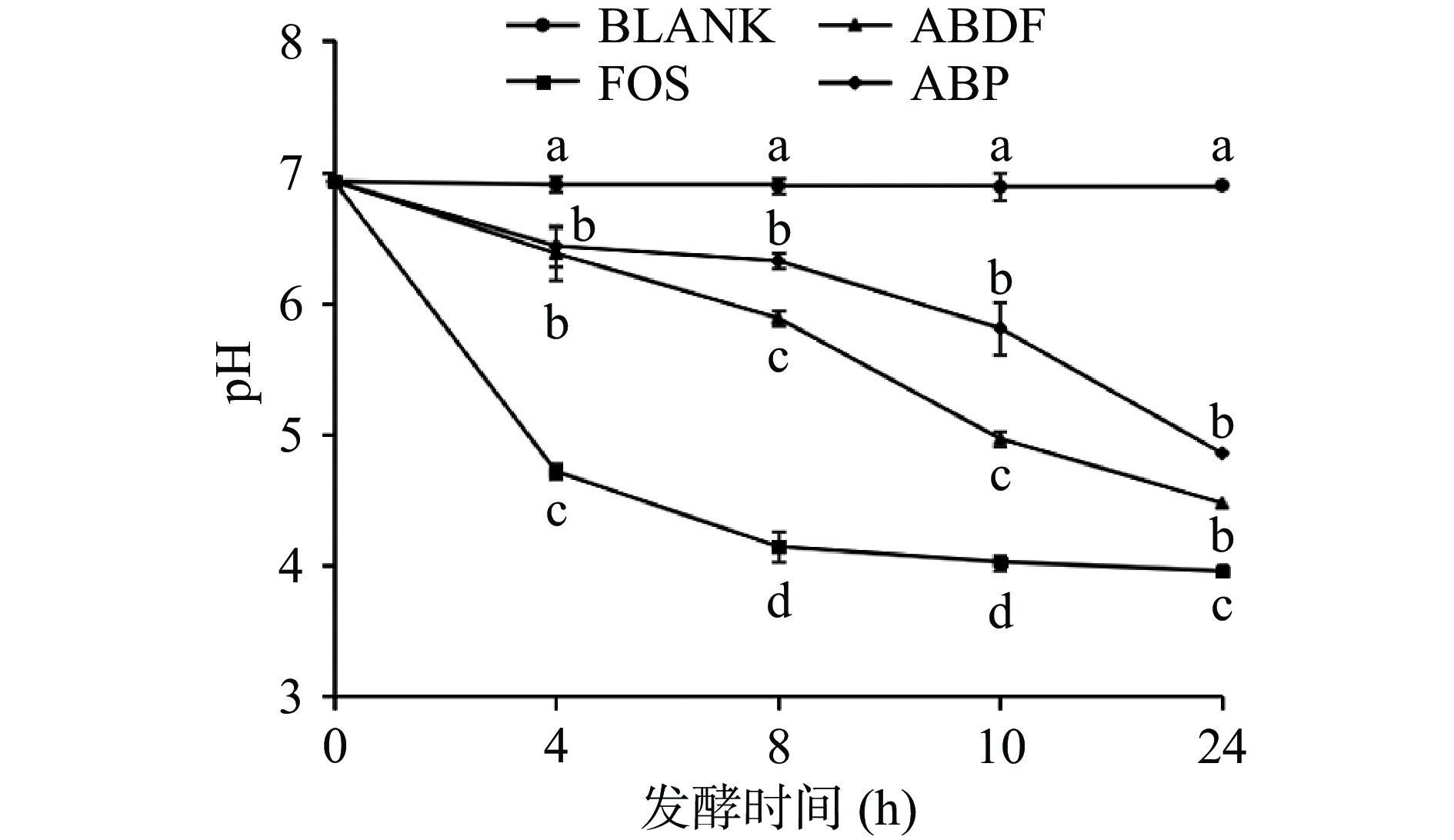
 下载:
下载:

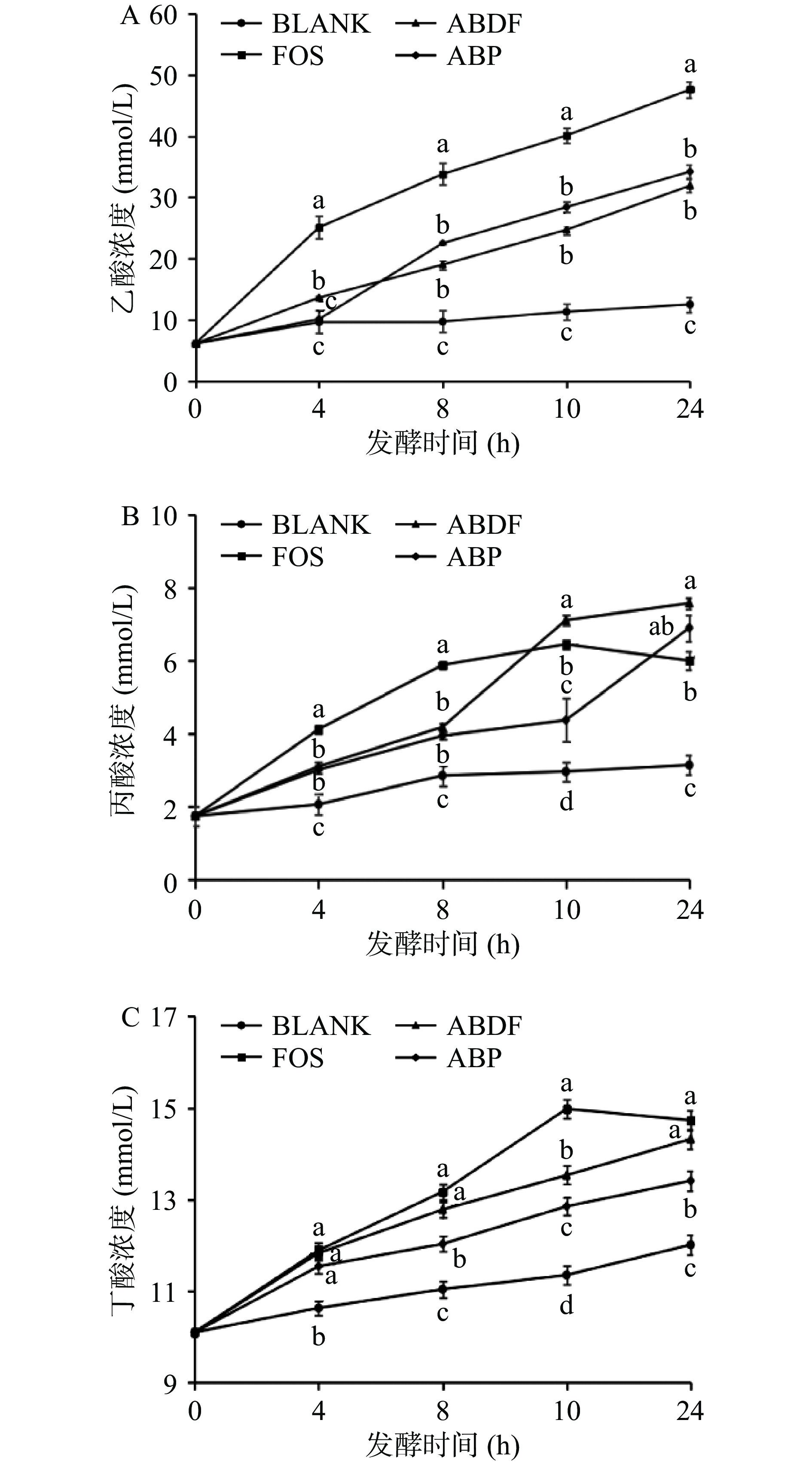
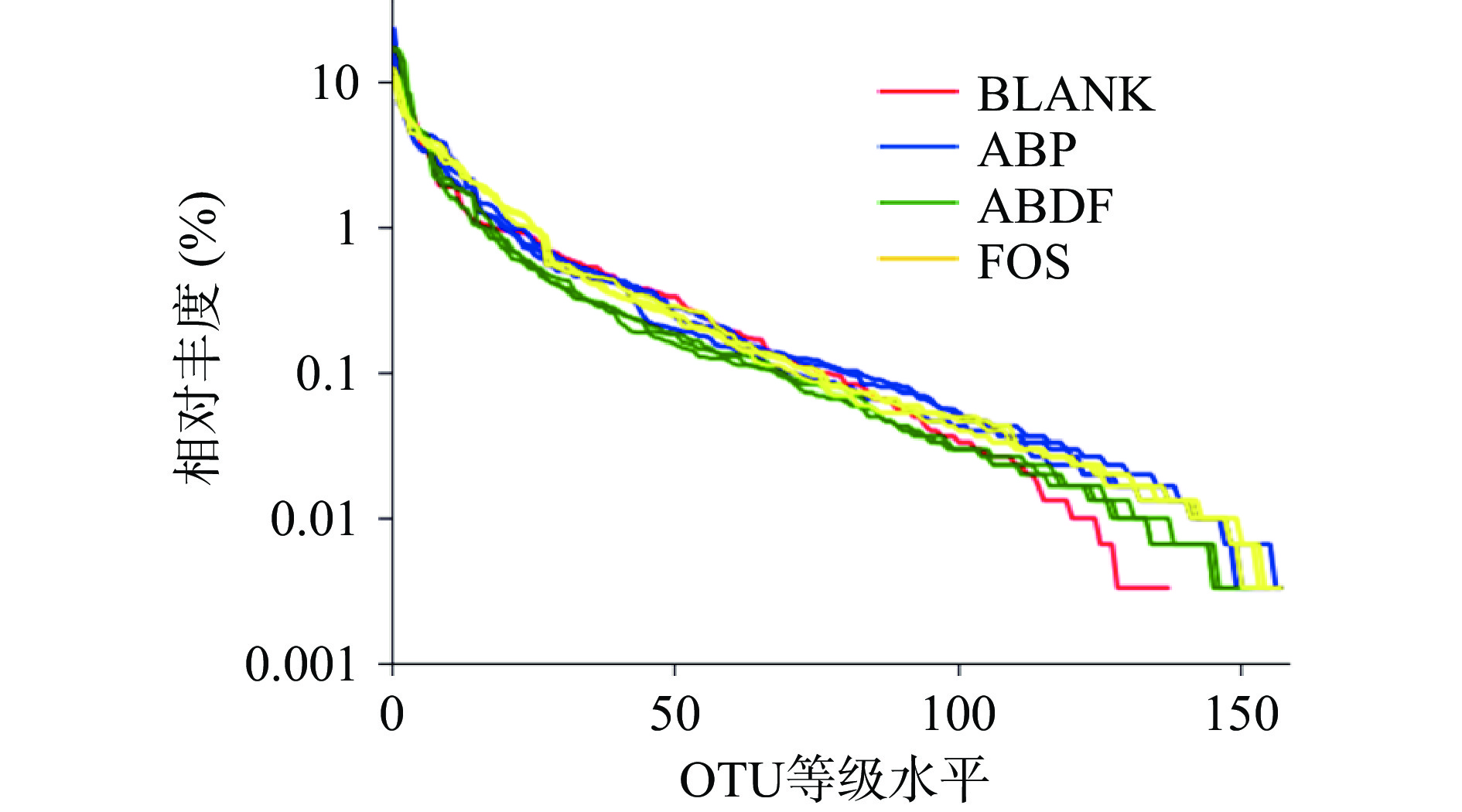
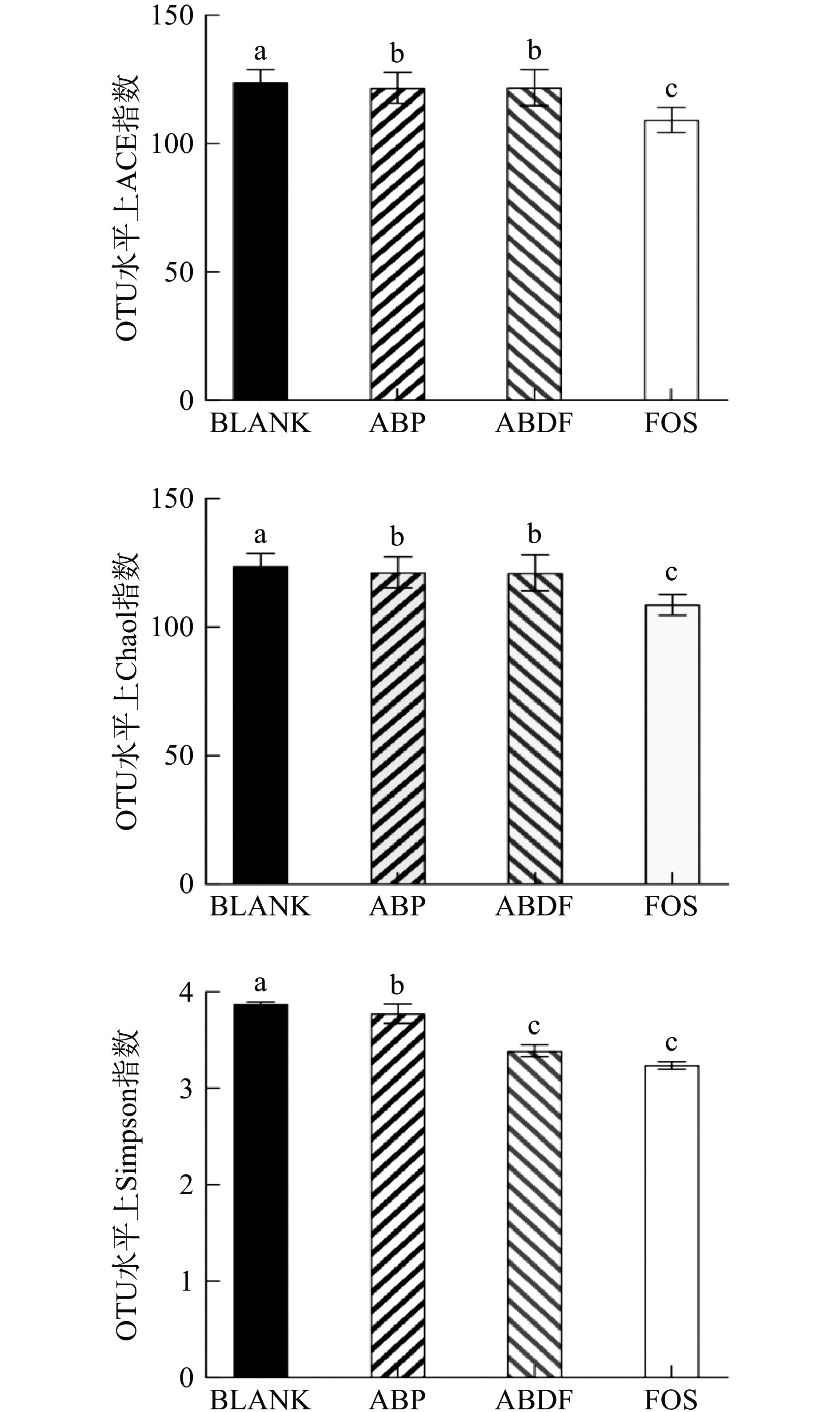
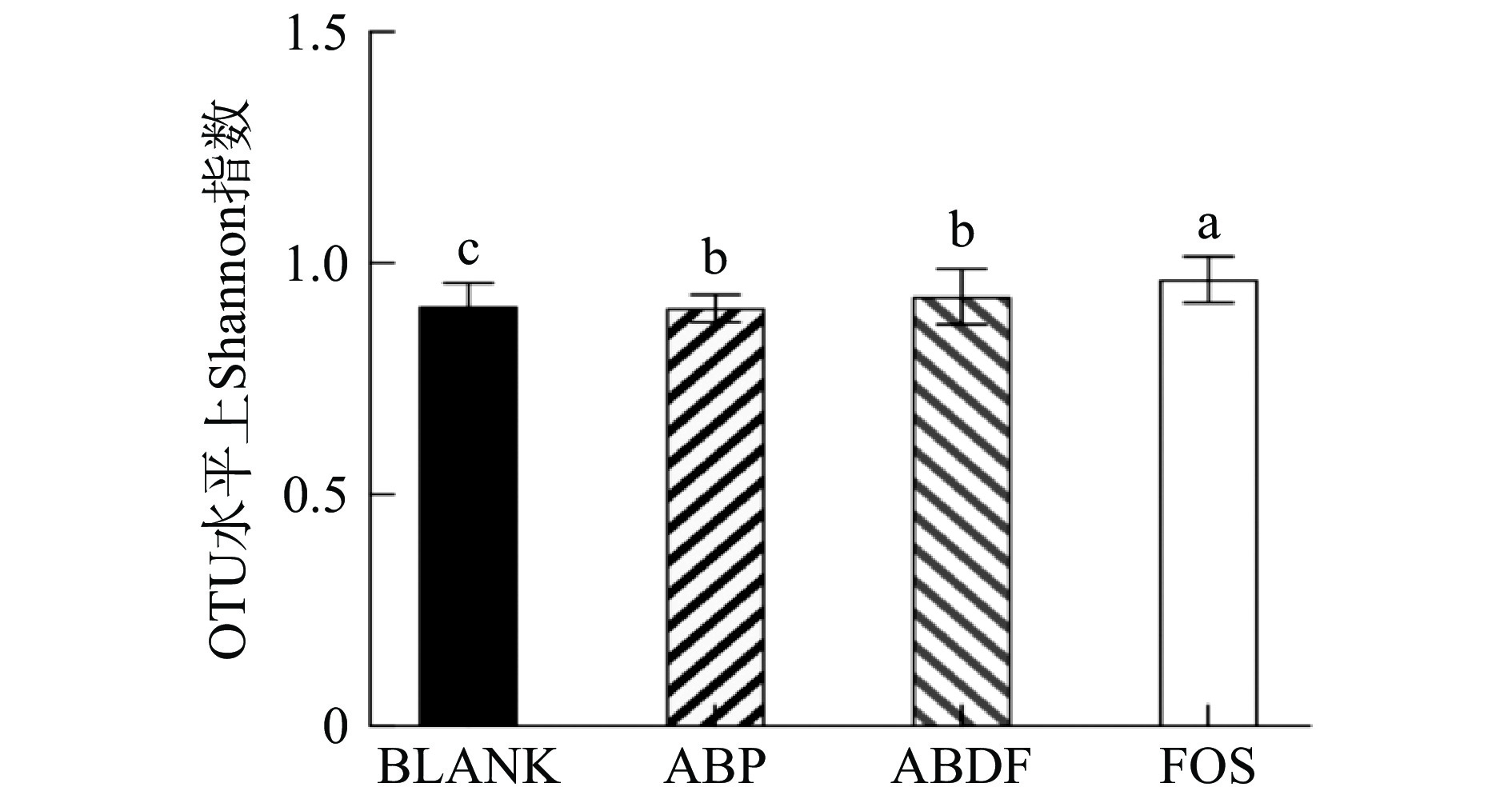
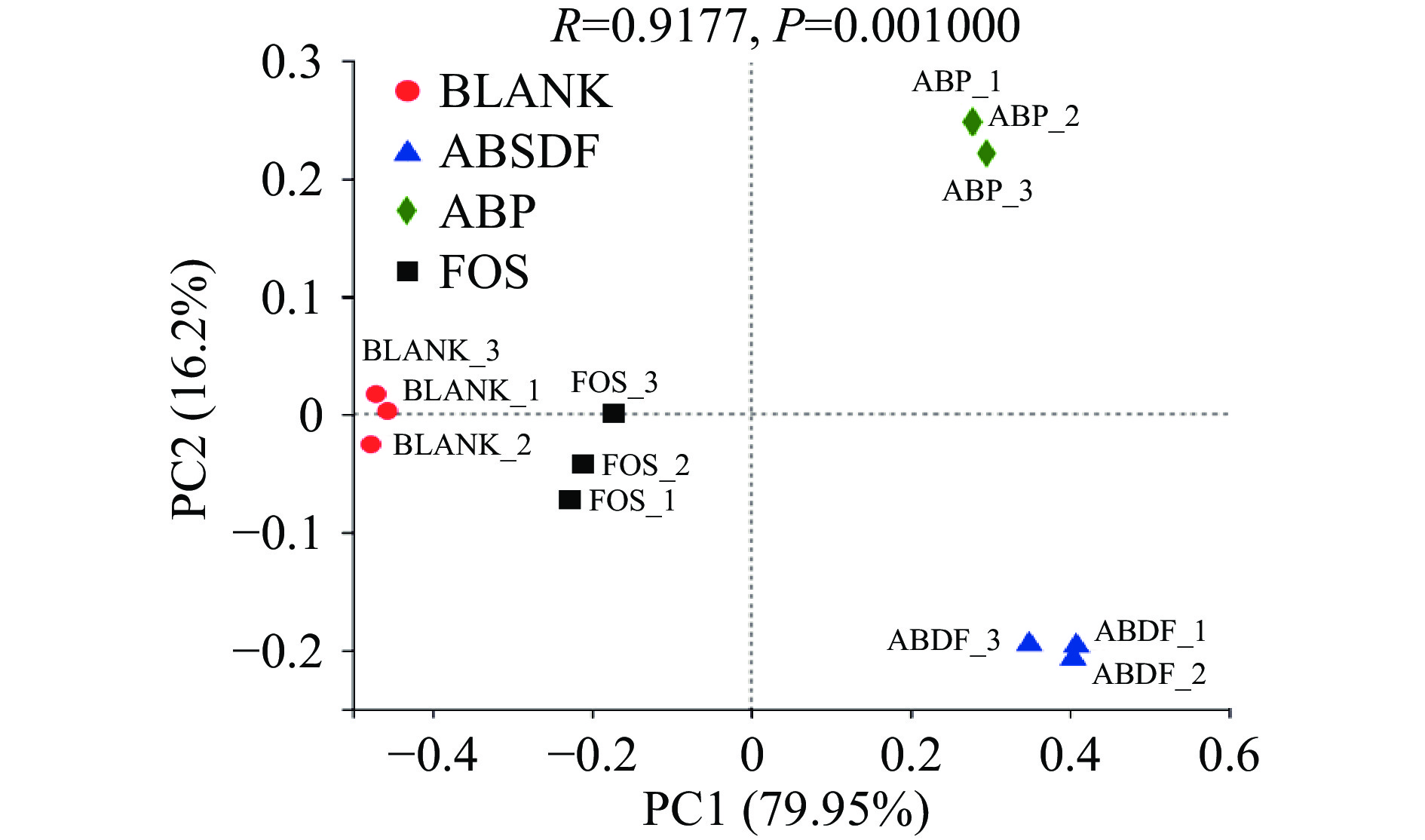
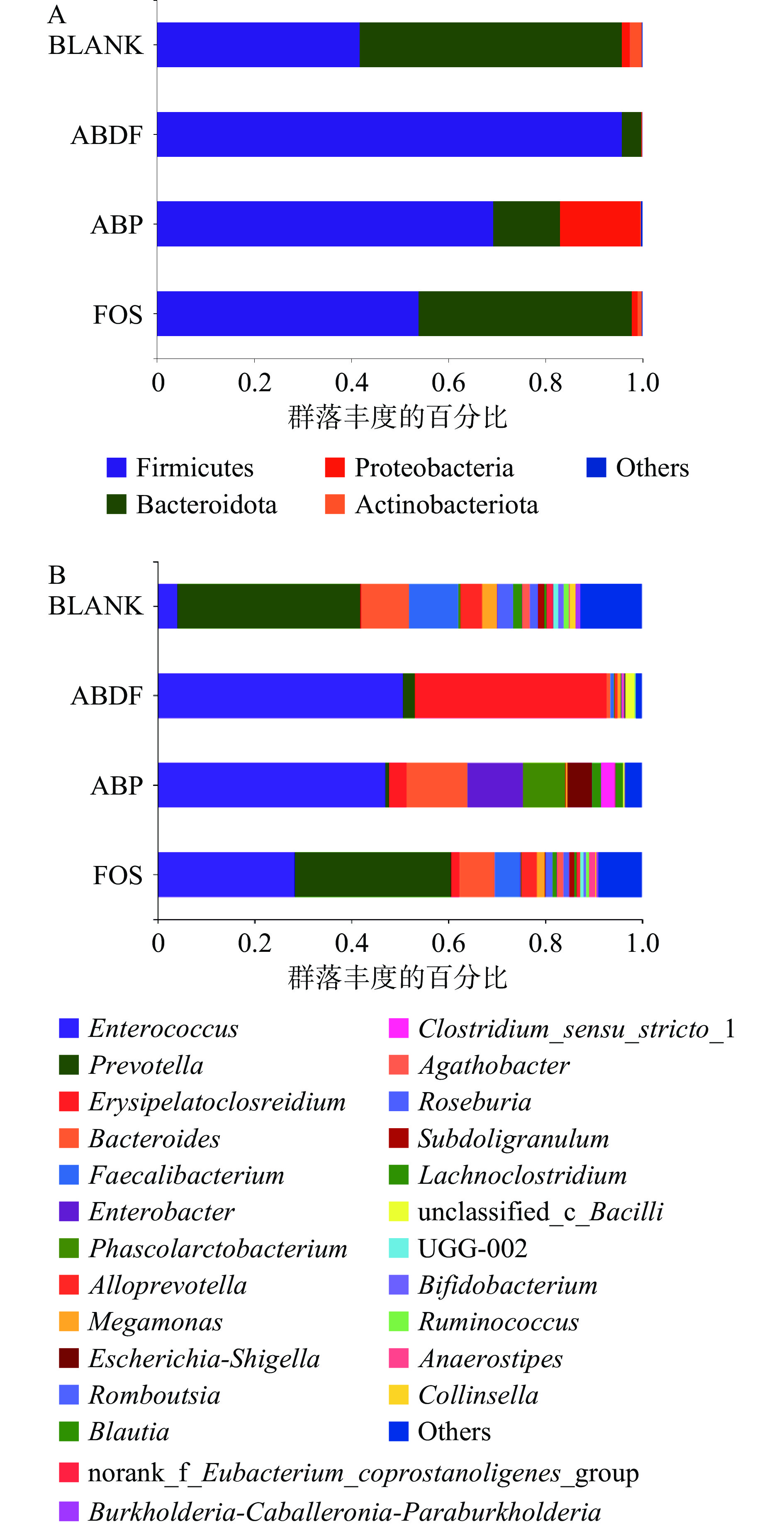

 下载:
下载:



